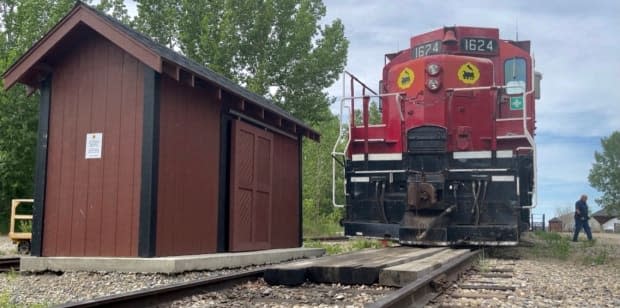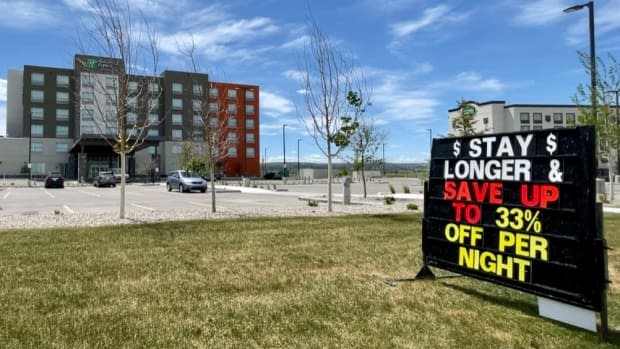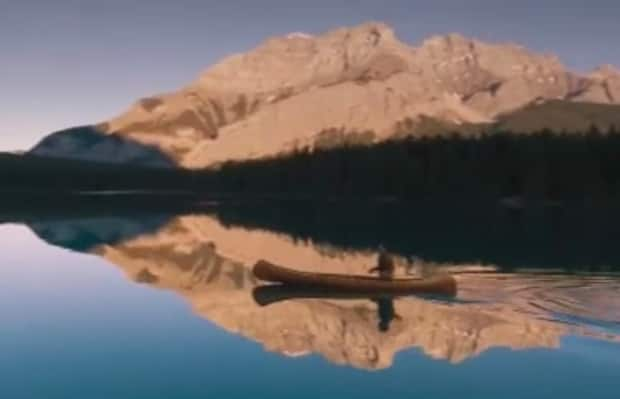Tourism operators to Albertans: 'We could really use some visitors'

In the span of 17 years, Jason Thornhill has transformed a flat section of prairie into a destination for gardeners, campers, adventure seekers and train lovers.
The section of land southeast of Calgary, covering 90 or so acres (36 hectares), had the good fortune of having an old, unused CP Rail line cutting through it. So after Thornhill established a garden centre, gift shop and campground, he turned his attention to trains.
Thornhill purchased the 22-kilometre section of track and started buying up old passenger railcars and engines. Since 2015, he's been running a number of lunch and dinner excursions for guests through the summer — and winter, after he secured the rights to the Polar Express story from Warner Bros. Entertainment. The Polar Express excursion alone involves 80 staff members.
But COVID-19 derailed his business as the trains haven't rolled since last fall.
"We're down approximately 30 per cent of our income with all that's been happening," he said.
That's his overall business operation. His train excursions went from 20,000 passengers a year to 2,000 last year.
"We could really use some visitors in 2021."
It's become the rallying cry for tourism operators in Alberta, who are trying to salvage something over the next few months as people shake loose from COVID restrictions and start to think about dining out, visiting museums and attractions such as Thornhill's Aspen Crossing near Mossleigh.

The summer of 2021, according to the CEO of Tourism Calgary, is all about recovering from the pandemic — and tourism operators have less than three months to do it.
"You look to see who's left standing, you look to see, you know, who's going to emerge and how differently that emergence will be as we move into this," said Cindy Ady.
In 2019, tourism spending in Alberta contributed $6.5 billion to the provincial economy.
But 2020 will be the industry's year to forget.
"It slammed us shut from top to bottom, whether it was airline, hotel, restaurant, food, catering, attractions — you name it. Our industry got hit across the board," said Ady.
Attractions slowly reopen
WinSport is still waiting to reopen some of its more popular summer attractions at Canada Olympic Park in Calgary, including mountain biking and a zip line known as the monster — activities that have been closed since 2019. Downhill carting opened earlier this month. The summer bobsleigh isn't scheduled to return until Aug. 1.
The non-profit organization was allowed to stay open for downhill skiing over the winter, which helped bring in much-needed revenue. But WinSport is not making any predictions for this summer.
"We're not making any assumptions of what the summer is going to look like. We're assuming there will be people taking staycations," said Dale Oviatt, the senior manager of communications for WinSport.
"Hopefully, we'll get some sort of, at least travel within Canada, and that can help us during the summer season," he said.

The Canada-U.S. border remains closed to non-essential travellers until at least July 21. The government says travellers from the United States spent $991 million in Alberta in 2019.
Southland Transportation, which operates coach service to Canmore and Banff under the On It brand, says the border closure has resulted in roughly 25 per cent fewer customers. The company is hoping to bounce back this summer, but still expects a decline from the 20,000 passengers it saw in 2019.
"I'm hoping to exceed 10,000 passengers this year travelling out, that's our target," said Jonathan Weal, Southland's director of business development.
Long road to recovery
Tourism experts and industry groups predict a long recovery for accommodation, transportation and food and beverage businesses, as well as conference, event and attraction operators.
The Hotel Association of Canada said during a recent conference call about the border reopening that 70 per cent of its members are at a breaking point and will not survive the remainder of the year without further government support.

Hala Dehais, who is the academic chair at the School of Hospitality and Tourism at SAIT, says it's predicted it will take two to three years for the industry to recover from the effects of the pandemic.
An emerging concern is the ability to lure employees back to the sector.
"A lot of people have either re-skilled into new industries or aren't quite ready to come back yet," said Dehais.
"I think the stability will bring people back," she said. "Knowing that there's not a risk to coming back is really going to help."
The school is hoping to increase enrolment in its program from 240 students per year to as many as 400.
Restrictions easing, visitors expected
Calaway Park, an amusement park and campground just west of Calgary, is looking forward to the end of most COVID restrictions that have limited guest numbers and revenues.
The one-third capacity limit is expected to be lifted on July 1. However, the general manager hasn't decided if Calaway will move immediately to 100 per cent capacity.
WATCH | Conservative MP Blake Richards asks when federal government will provide benchmarks for safe reopening:
"We'll look at best practices," said Bob Williams, who says government wage subsidies helped his business during the pandemic.
It's a cautious approach in an industry that has lost so much.
"[The] tourism industry was the hardest hit, and it will be the last to recover," he said.
Campaign to target Albertans first
Travel Alberta launched a campaign last week that is also taking a somewhat cautious approach. It's encouraging Albertans to visit local attractions before booking a post-pandemic getaway outside the province or country.
"We're targeting Albertans to see if we can inspire them to find the hidden gems throughout the province," said Tannis Gaffney, who is the vice-president of destination promotion with Travel Alberta.

She says the commercials will run outside of Alberta as restrictions ease and more people are immunized against COVID-19.
"We know that about 30 per cent of tourism operators in the province are at risk of closing," she said.
"So this summer is critical to get those travelers and visitors through the door so that, you know, we can save these local operators and ensure that they're open for business for a number of seasons to come."
Bryan Labby is an enterprise reporter with CBC Calgary. If you have a good story idea or tip, you can reach him at bryan.labby@cbc.ca or on Twitter at @CBCBryan.

